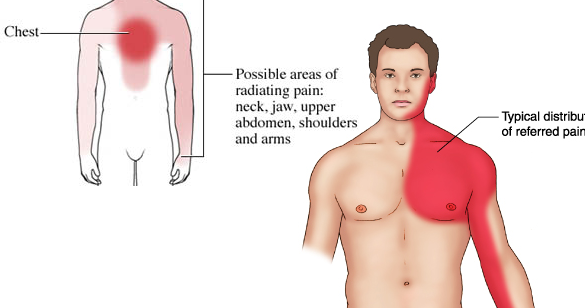Anxiousness Chest Pain
The type, severity, period, and also associated signs and symptoms of upper body discomfort can help direct medical diagnosis and also further therapy. Dr Peeyush Jain, Head, Division of Preventive Cardiology, Fortis-Escorts Heart Institute, New Delhi, tells you the difference.
Lots of people that experience a heart attack have indication hrs, days or weeks in advance. The earliest warning sign of obstructed heart arteries may be ongoing episodes of upper body pain that begin when you're literally granitos con pus en el pezon active as well as are soothed by remainder. Nevertheless, during a cardiac arrest those signs and symptoms show up also without any exercise. When they are having one, having a panic strike can absolutely feel like a heart attack; people usually think they're dying. In addition to upper body pain, symptoms can consist of a battering heart, sweating, shaking, queasiness, que significa tener granitos en el pezon lightheadedness, and also a sensation of going crazy.
How do I know if my chest pain is anxiety?
People who injure the muscles in the chest wall may experience: pain that increases with movement of the chest or upper spine. pain that worsens when breathing deeply, sneezing, or coughing. an area of soreness or tenderness within the chest wall.

Facility for Complementary as well as Integrative Health.
While some may fold due to a vice-like grip around their hearts, others might feel as though a bear is depending on their breast. If you have angina, it indicates you have underlying coronary artery disease, but it does not necessarily suggest you're having-- or are at enhanced risk of having-- a cardiovascular disease. Blood supply to the heart muscular tissue is commonly minimized by atherosclerosis, the accumulation of fatty plaque in the arteries that supply the heart. The pain from a cardiac arrest may be called severe stress, pressing or volume.
Along with breast discomfort, this heart muscle swelling might create fever, exhaustion, rapid heart beat, and difficulty breathing. Although no clog exists, myocarditis symptoms can resemble those of a heart attack.
An incredible 80 percent of clients that complain of upper body discomfort during primary care check outs are just experiencing NCCP. Unsteady angina is more severe than secure angina as well as it can happen even at remainder. The breast pain might last as long as thirty minutes and does not go away with remainder or medication. It might proceed to a heart attack when full blockage of the coronary artery occurs.

- A number of the root causes of breast pain that we have actually listed here call for clinical screening as well as imaging to determine, as well as can't be identified by symptoms alone.
- Today, the reality that diagnosis and also therapy for heart pain are definitely far better than they remained in 1954 is an outstanding reason for concerned people not to delay seeking help.
- Sudden, extreme pain in the chest may indicate a cardiac arrest or cardiac arrest.
- Your doctor can run tests to see to it there aren't any type of underlying wellness problems causing your gas discomfort.
Angina Information and also Interpretation.
Beyond specific cardiac root causes of upper body pain, there are absolutely non-cardiac causes of upper body discomfort that can be lethal. Lung blood clot is a condition in which an embolism blocks blood circulation to the lungs. This is typically related to intense breast pain as well as shortness of breath. Aortic dissection takes place when the cellular lining of the aorta all of a sudden rips or splits as well as is related to severe, severe upper body discomfort that frequently radiates to the back. Pneumothorax, granos en la aureola del pezón or fell down lung, is one more deadly condition connected with severe breast pain and shortness of breath.
How do you know if chest pain is muscular?
pain that increases with movement of the chest or upper spine. pain that worsens when breathing deeply, sneezing, or coughing. an area of soreness or tenderness within the chest wall. upper back pain.
If a person thinks that they are having one, or if they experience any new, unusual chest discomfort, they must call emergency situation services right away. Angina is usually a sign of coronary heart disease (CHD), which takes espinilla en el pezon durante la lactancia place when the arteries become blocked.
Do not play medical professional-- go see one, quickly, if you are worried about pain or discomfort in your chest, upper back, left arm, or jaw; or unexpectedly faint or develop a cold sweat, nausea or vomiting, or throwing up. Call 911 or your regional emergency situation number to mobilize an emergency situation medical crew.
Anxiousness as well as anxiety attack.
Or, they might experience uncommon signs (shortness of breath, fatigue, weak point). Women are most likely than males to have signs and symptoms of nausea or vomiting, vomiting, back or jaw pain, and also lack of breath with upper body pain. Upper body discomfort can feel different relying on the structure and also the casue influenced.
Though breast pain or discomfort is the most usual heart attack symptom, females are more probable than men to experience various other symptoms like nausea or vomiting, throwing up, fatigue, and also lack of breath. Most upper body discomfort isn't a sign of anything major yet you should get medical recommendations just in instance. If you think you're having a heart attack, obtain instant clinical help. Musculoskeletal pain can often happen from swelling or injury to the muscles or bones of the chest wall surface.



